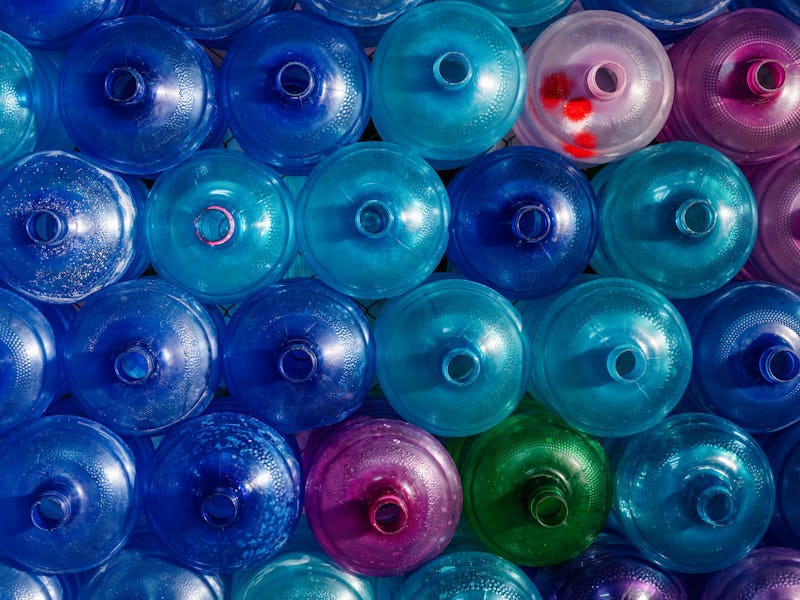Can you drink too much water? A hydration scientist explains the myth
“If you catch yourself going to the bathroom every 15 to 20 minutes, you’re overdoing it.”

The year was 2007 and Jennifer Strange was competing in a local California radio station contest to win a Wii for her children. The challenge? Drink as much water as possible without peeing your pants.
This “Hold Your Wee for a Wii” challenge seemed like harmless fun as Strange and other contestants drank at first 8 ounce glasses of water every 15 minutes and then larger glasses as the contest continued. Strange came in second place after drinking more than 1.5 gallons of water.
But as she returned to her Sacramento home Strange called friends to complain of an intense headache after completing the contest. When her mother checked on her later that day, she found Strange dead from what a coroner later confirmed as water intoxication or dilutional hyponatremia.
Competitive water drinking may be an uncommon habit, but drinking gallons of water a day as prescribed by wellness influencers on TikTok and Instagram isn’t. These influencers and their motivationally labeled jugs of water seem to lead by the assumption that there’s no such thing as too much water. But is that really true?
For many people, drinking enough water per day can be a challenge. But for a rare few, it’s too much water that poses a risk.
Stavros Kavouras is a professor of nutrition at Arizona State University and director of ASU’s Hydration Science Lab. Water intoxication is very real, although Kavouras says it's extremely rare in the general population. Because of this, Kavouras says that federal guidelines for water consumption don’t tend to include an upper limit.
Ultimately, the answer is complicated, Kavouras tells Inverse — especially because the science of hydration is in its infancy.
“I like to call water the forgotten nutrient,” Kavouras says. “We are just scratching the surface of the iceberg right now. I would say during the last 10 years we have learned more than what we knew during the last 100 years.”
Can you really drink too much water?
“Practically speaking, there is no limit,” Kavouras says. While water intoxication is a possibility, you would have to “go above and beyond anything a normal human might do.”
Where hyponatremia is slightly more common, however, is among endurance athletes like marathon or ultramarathoners.
While not a rampant problem, there are a number of reported cases of competitors drinking too many fluids in their recovery or through their races at a rate faster than they can excrete through sweat. There are even documented incidences of runners gaining seven to twelve pounds of water weight in a single race, Kavouras says.
Influencers often swear by hydration.
What are the symptoms of too much water?
In addition to retaining the water they consume, other symptoms of hyponatremia also include:
- Headache
- Nausea and vomiting
- Confusion
Much more than just the discomfort of a full bladder, these symptoms occur when the amount of water in the body begins to dilute the salt content of the blood itself. As a result, cells in the body become waterlogged and swell — much like a raisin dropped in water, Kavouras says.
For brain cells that are encased in a non-flexible skull, this swelling can result in dangerous pressure on the brain.
How much water in a day is too much?
But how can you know if the amount you’re drinking is too much? The rule of thumb is to observe whether or not you’re experiencing any of the above symptoms or if you’re peeing too frequently.
“If you catch yourself going to the bathroom every 15 to 20 minutes, you’re overdoing it,” Kavouras says.
Another way to think about this biological limit is to consider how fast your kidney — your body’s natural Brita filter — can process water. Kavouras says that, on average, our kidneys can handle filtering below half a gallon per hour. Anything above that rate, however, might spell trouble.
This means that if you’re drinking a gallon of water a day to meet your hydration goals, that should be no problem for your kidney. Instead, whatever excess your body doesn’t need for its biological processes (like keeping your organs operating smoothly) will just be excreted.
How much water should you drink per day?
Even though cases of hyponatremia can be alarming to read about, Kavouras says that the biggest health issue by and far when it comes to hydration is still dehydration. This is especially true for older adults, whose thirst cues can weaken, and young children.
How much water you individually need could vary based on your activity level and body size. For example, a linebacker likely needs more water than a less active office worker, Kavouras says.
As you get older, your body’s natural hydration cues (like feeling thirsty) might be harder to recognize.
On average though, dietary guidelines say optimal hydration can be achieved by drinking between 2.7 and 3.7 liters of water per day, with the lower bound being ascribed to women and the upper to men. Crucially, about twenty percent of this metric also includes the water you consume via foods, like watermelon or even bread.
This works out to a drinking need per day of roughly eight to 10 eight-ounce glasses, Kavouras says: the so-called “8x8” rule. This might also look like peeing 6 to 7 times per day and seeing diluted, lemonade-colored urine.
Ultimately, whether you’re watering trees on a hydration tracking app or crushing your gallon jug by bedtime, hydration in its many forms will have a positive impact on your health, from cognition to kidney health. Just don’t overdo it.
CHECK, PLEASE is an Inverse series that uses biology, chemistry, and physics to debunk the biggest food myths and assumptions.
Now read this: Scientists reveal the true danger of eating too many carrots
This article was originally published on